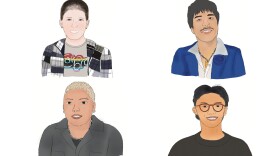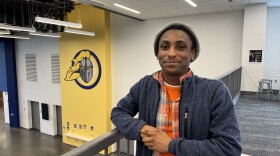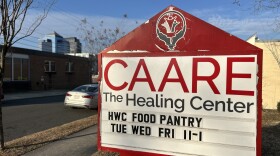Shirlette Ammons' new record "Spectacles" opens with the voices of people explaining what it means to be a spectacle and to gaze at a spectacle.
Ammons joined WUNC recently to talk about this collection of songs, which harnesses the full range of music and influences you can feel all the way from small town eastern North Carolina to the art and tech scene in Durham and beyond.
And it’s all filtered through the lens of a Black queer southern truthteller.
This is an excerpt of an edited transcript of that conversation. You can hear the full interview by clicking the LISTEN button at the top of this post.
As we listen to the song Spectacles, I want to know how you feel about the duality of that word.
"Well, that was part of the reason I extended this whole notion to artists at the top of each side of the record, because I do think there are two ways it could be perceived. Sometimes you invite the gaze and sometimes you repel the gaze. For me, it's weird and complicated being an identical twin and always being stared at and gazed at and being a spectacle my entire life.
"And then, lo and behold, I choose a career that puts me on stage asking people to look at me. So, this record was my effort to like actively interrogate that for myself."
What's your level of discomfort with that position of being on stage and saying, "Hey, look at me?" Because some of that you have to have to be successful.
"Correct. And it vacillates. I mean, this might be just a country thing being from eastern North Carolina. One of the mantras that was handed down to me from my grandma is, 'If you don't have nothing to say, shut up.' That's how I treat the stage. I speak till I have nothing else to say.
"I try not to take up too much space, but I try to own the space I choose to take up. And that's a fine line, always. And there's an exchange in the idea of spectacle too that I kind of had to accept with this record. Not only am I a spectacle — so is the audience and my perspective is a privilege. On stage, I'm isolated, I'm separated from the crowd, and I try to mend that space however I can, usually through stories, that are personal, but that other folks can relate to."
This feels like a communal affair with so many friends and luminaries involved. I counted 23 players and performers, and that doesn't even include producers and engineers. Did you know from the start that you wanted to get a lot of people to pitch in on these songs?
"I appreciate collaboration because I know the limits of what I can do. And I try to treat the song as a third being. I ask myself, what does the song need in order to be its best self? And if I ain't it, I do not mind sacrificing that role. And gratefully, North Carolina, particularly the Triangle area, particularly Durham, it's just so full of creative, brilliant minds. And so, I have no qualms. My pride don't keep me from asking folks to participate, especially if it makes the work better."
On Short, you get some vocal help from Mavis Poole and it's about coming up short, which, like spectacles, can have more than one meaning. What would you like listeners to take away from that song?
"This goes back to a concept that has stuck with me ever since I've been a public figure or a performer or creative person. This concept of wealth and how we redefine that. One of my favorite quotes is by Nikki Giovanni in her poem called 'Nikki-Rosa' that says, 'I hope no white person ever has cause to write about me because they never understand that Black love is Black wealth.'
"And so, when I think about coming up short, like growing up in eastern North Carolina, product of poverty in terms of financial wealth. Just thinking of other ways to overcome that shortness and celebrating it in a kind of blues way. The way the blues takes the worst of a thing and makes it better via the vehicle of the music. And so that's what I was trying to do — calling on that tradition a little bit."
There are lots of things I like about All The Things, because I'm a Prince-a-holic, too. But one of the best is the line, 'I was remiss reminiscing about the time I whispered up the stitch of his hem.' Did you get close enough to do that?
"Well, the beauty of writers is that we have the opportunity to embellish a bit. That's how I remember it many years removed and I'm sticking to it, by the way."
That is your story.
"I was in a room with Prince, and I was like, Oh, and I was from the country. I'm like, Oh, snap. That's Prince. And he literally was surrounded by models. I mean, I was not — but Prince was. Just being in that room and then having the re-memory of that and then applying the tools of a writer to it was really fun to write. Also, it was nice to just pay homage to Prince who is amongst the best ever do it."
Pop song extraordinaire Hello features Amelia Meath from Sylvan Esso and ends with the joyful sound of a children's choir ... plus, loved those 80s double deck cassette players. Every time I play it, it sticks in my head for the rest of the day. Do you really think it'll be alright? There's that refrain, 'It'll be alright.'
"Great question, man. I don't know. But you want to think that, and also, I wrote that as like my pandemic anthem, and I guess I like folks to approach it with that in mind, especially, when we're dealing with other issues globally and internationally that don't feel like it'll be all right. And I think it's important for me to say that I hope people don't find that minimalizing, me saying that, because the only way anything is all right is if we trouble it and hold truth to power. I don't mean it flippantly at all, or frivolously."
It doesn't sound like that. And it is an incredibly infectious song, but it does really make you think. If we didn't have hope, if we didn't think things could be all right, we would all just live under a rock and call it.
"It requires action. It requires us to say, we don't want genocide in our name. It requires us to say, we do want folks to be able to have access to equal pay, equal education. We want to trouble LGBTQ rights. We think trans kids should be allowed to live and exist in their bodies as they choose. We have to say that and that's how it becomes alright. Also, I feel like that's the role of artists — to kind of put those things in the fore and make sure that they stay in the public psyche and part of the public conversation."







